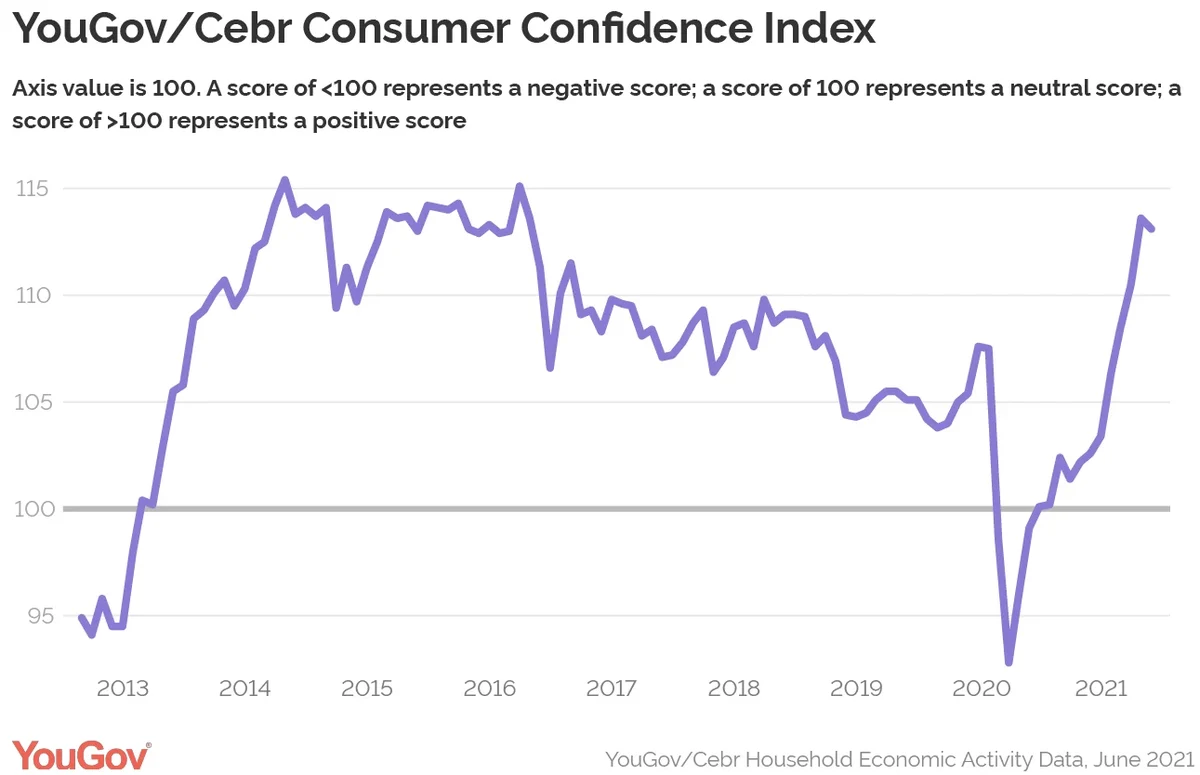- Consumer confidence falls by 0.4 points to 113.1 but is still at levels not seen since 2016
- Outlook on job security falls by 4.4 points from highest score on record last month
- Confidence among households about personal finances cools
- Business activity continues to rise to 111.9 (+1.6)
As many Britons prepare for the end of coronavirus restrictions following a one-month delay, the latest analysis from YouGov and the Centre for Economics and Business Research (Cebr) shows consumer confidence remains at levels not seen since before the EU referendum in 2016.
The index fell slightly by 0.4 points to 113.1 in June. Any score above 100 means more consumers are confident than not. While sentiment around household finances and job security prompted the dip, optimism remains strong around house prices and business activity.
YouGov collects consumer confidence data every day, conducting over 6,000 interviews a month. Respondents answer questions about household finances, property prices, job security and business activity, both over the past 30 days and looking ahead to the next 12 months.

After reaching record a high in May, the outlook for job security over the next 12 months fell by 4.4 points in June to 114.5. More workers than not also felt their jobs became less secure in the past month, with the measure falling by 1.5 points to 92.4. However, this is still higher than the average score since 2012 (90.4) and there has yet to be a month where more employees than not believe their job became more secure.
Britons felt less positive about their personal finances in June compared to the previous month. Expectations for the coming year fell by 2.7 points to 104.2 but a higher number of households still feel optimistic about their money situation than in previous years.
Similarly, the retrospective measure fell by 1.9 points and is now at 96.8. While it’s in negative territory, it’s significantly higher than the average of 90.4.
Optimism among property owners remained strong in June, with the measure for house value rising by 2.2 points to 125.2. This comes as UK house prices increased at the fastest rate since 2004, as buyers rush to complete sales before the stamp duty holiday is phased out.
Likewise, many homeowners expect the value of their property to keep increasing over the next year with home value expectations improving by 1.9 points to 131.6 – the highest level in three years.
June was also a strong month for businesses. Employees report activity at their workplace rising in June, with the measure improving by 1.6 points to 111.9. They expect this trend to continue in the next 12 months, with the outlook for business activity rising to 128.5 (+1.5). This is the highest it has been in seven years.
Additional research shows that Britons are split on whether they expect the economy to expand or shrink in the next year, at 52% vs 48%. With rising inflation levels, seven in ten people (70%) also now believe that interest rates will go up in the next twelve months.
Darren Yaxley, Director of Reputation Research at YouGov, said:
“YouGov and Cebr’s June consumer confidence index is yet again led by home value perceptions, with the largest increase seen in optimism for homeowners in June. While property prices are increasing at their fastest rate in 17 years this growth is likely to slow down as the stamp duty holiday comes to an end. June was also a strong month for businesses, with the outlook for the coming 12 months healthy and a majority of Britons expecting the economy to expand.
“Although it decreased marginally by 0.4, June’s index is mostly optimistic with the majority of the metrics in positive territory. Job security and household finances for the past 30 days are the only metrics to remain in negative territory, although these figures are still higher than the metrics’ average scores, indicating that consumer confidence in the economy is strong.”
Sam Miley, Economist at the Centre for Economics and Business Research, said:
“Though the YouGov/Cebr Consumer Confidence Index has exhibited a monthly fall for the first time since October, the view from consumers remains predominantly to the upside. One cause for concern, however, relates to the Index’s job security measures, which were the main drivers of June’s headline fall. The furlough scheme has now entered its tapering phase, with employers now being liable for a higher portion of furloughed employees’ wages. As we progress throughout Q3, worries over job security are likely to become more prevalent, given that a wave of redundancies is expected upon the scheme’s eventual termination at the end of September.”











